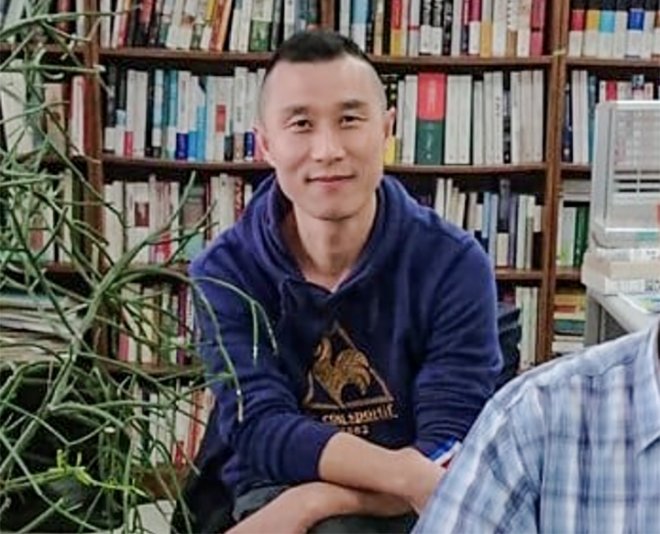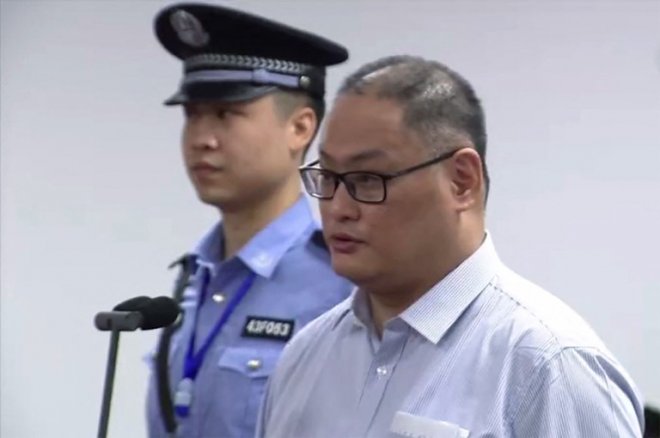
China on Wednesday confirmed it is holding a Taiwan-based publisher under investigation for "activities that endangered state security," several days after he disappeared during a visit to Shanghai.
Eight Banners Press founder Li Yanhe, known by his pen name Fucha, is currently under investigation by state security police. Radio Free Asia reported his detention last week, citing Bei Ling, a key figure in the Chinese literary scene.
"[He] is suspected of engaging in activities that endangered national security," Zhu Fenlian, spokesperson for the Taiwan Affairs Office of China"s cabinet, the State Council, told a regular news briefing in Beijing.
"The relevant parties will protect his legitimate rights and interests in accordance with the law," she said.
In Taipei, the head of the government agency in charge of handling relations with China said the Chinese Communist Party is trying to exert "long-arm jurisdiction" in democratic Taiwan, which has never been ruled by Beijing.
"China is trying to impose its long-arm jurisdiction here in Taiwan, which is a clear attempt at intimidation, and at the suppression of Taiwan," Mainland Affairs Council chief Chiu Tai-san told lawmakers on Wednesday, according to the island"s Central News Agency.
Publisher of critical works
A Taiwanese publisher who published many books banned in China, Li is believed detained in Shanghai, according to Bei Ling, sparking comparisons with the cross-border detentions and kidnappings of five Hong Kong booksellers in 2015.
Li had come to mainland China to visit relatives and tend to the graves of his ancestors, a reference to the grave-sweeping festival of Qing Ming on April 5.
His disappearance has sparked comparisons with the cross-border detention and kidnapping of five Hong Kong publishers from the Causeway Bay Bookstore in 2015, including Lam Wing-kei, who later sought refuge in Taiwan from an ongoing crackdown on dissent in Hong Kong.
Li, who is ethnically Manchu, founded the Eight Banners imprint under Taiwan"s Book Republic publishing group in 2009, using it to publish non-fiction works on China"s overseas infiltration and influence operations, the 1989 Tiananmen massacre, and other work critical of Beijing.
Li was born in the northeastern Chinese province of Liaoning and joined the Chinese Communist Party after graduating from university, before rising to become vice president of the Shanghai Literature & Art Publishing House.
He married a Taiwanese woman in 1996, and settled in Taiwan in 2009. His last Facebook post was made on March 12.
Party leader’s detention
Chiu also hit out at the ongoing prosecution of Taiwan National Party Vice Chairman Yang Chih-yuan, who was detained in August 2022 under China"s national security law as U.S. House Speaker Nancy Pelosi visited Taiwan.
 Yang was arrested by state security police in the southeastern city of Wenzhou and accused of having founded the pro-independence Taiwan National Party, with the aim of "promoting Taiwan to join the United Nations as a sovereign and independent country."
Yang was arrested by state security police in the southeastern city of Wenzhou and accused of having founded the pro-independence Taiwan National Party, with the aim of "promoting Taiwan to join the United Nations as a sovereign and independent country."
He was placed in "residential surveillance at a designated location" from Aug. 4, 2022, in the eastern province of Zhejiang, meaning that he was held with no access to a lawyer or to family visits for six months.
Lee Ming-cheh, a Taiwanese community college manager who served a five-year jail term in China for "subversion" linked to his activism in the island"s ruling Democratic Progressive Party, said that while some of his activism had connections to China, Yang"s activities had all been carried out in Taiwan.
He said Yang"s arrest and prosecution should sound a warning to any politically active Taiwanese, and not just regarding travel to China, Hong Kong or Macau.
Secret police operations
The warnings over China’s “long-arm” law enforcement came a day after Taiwan’s national security chief said Beijing could be running secret police operations on the island.
“[They] could be surveilling Chinese nationals or their spouses in Taiwan, through connected individuals or organizations,” National Security Bureau director Tsai Ming-yen told the island’s Legislative Yuan.
“They do exist … we are currently investigating,” Tsai told lawmakers in comments reported by the Taiwan News.
Asked if Li was “lured” or pressured into returning to China – one of the key tasks of dozens of overseas secret police stations, according to the Spain-based rights group Safeguard Defenders – Tsai declined to comment, but said Li had been detained for publishing books in Taiwan containing “politically sensitive” topics frowned on by Beijing.
Beijing has shut down a number of the offices in the wake of a September 2022 report from the Spain-based Safeguard Defenders group listing dozens of such operations, which sparked investigations and orders to shut down from governments around the world.
Translated by Luisetta Mudie.
